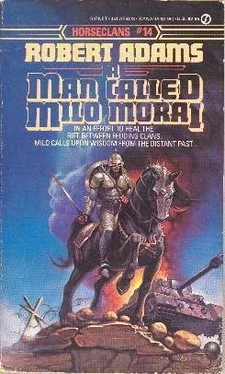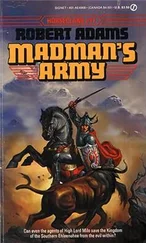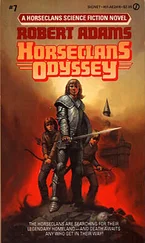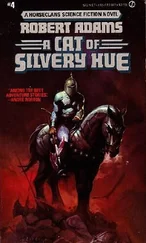Robert Adams - A Man Called Milo Morai
Здесь есть возможность читать онлайн «Robert Adams - A Man Called Milo Morai» весь текст электронной книги совершенно бесплатно (целиком полную версию без сокращений). В некоторых случаях можно слушать аудио, скачать через торрент в формате fb2 и присутствует краткое содержание. Жанр: Фантастика и фэнтези, на английском языке. Описание произведения, (предисловие) а так же отзывы посетителей доступны на портале библиотеки ЛибКат.
- Название:A Man Called Milo Morai
- Автор:
- Жанр:
- Год:неизвестен
- ISBN:нет данных
- Рейтинг книги:3 / 5. Голосов: 1
-
Избранное:Добавить в избранное
- Отзывы:
-
Ваша оценка:
- 60
- 1
- 2
- 3
- 4
- 5
A Man Called Milo Morai: краткое содержание, описание и аннотация
Предлагаем к чтению аннотацию, описание, краткое содержание или предисловие (зависит от того, что написал сам автор книги «A Man Called Milo Morai»). Если вы не нашли необходимую информацию о книге — напишите в комментариях, мы постараемся отыскать её.
A Man Called Milo Morai — читать онлайн бесплатно полную книгу (весь текст) целиком
Ниже представлен текст книги, разбитый по страницам. Система сохранения места последней прочитанной страницы, позволяет с удобством читать онлайн бесплатно книгу «A Man Called Milo Morai», без необходимости каждый раз заново искать на чём Вы остановились. Поставьте закладку, и сможете в любой момент перейти на страницу, на которой закончили чтение.
Интервал:
Закладка:
His majority came through. Barstow presented him with a pair of gold oak leaves and jokingly pinned them on the shoulders of his gray tweed civilian coat, before he poured them each a glass of Scotch and sat down behind his desk, waving Milo to another chair.
“Once all this is done and most of the Army has gone back home, what are your plans, Milo? Mean to stay in the Army, do you? You could do a lot worse, you know.”
“I don’t know, colonel,” said Milo honestly. “My permanent rank is tech sergeant, and that, or at most master, is probably the best I could hope for in a reduced army of Regulars. I’ve promised to care as best I can for a dead buddy’s widow and four children, and I can’t see trying to do that on a sergeant’s pay. I might do better in the civilian world—I could hardly do worse, pay-wise.”
Barstow shook his head emphatically. “You’ve obviously been talking to old soldiers who stayed in after the last war. Things are going to be very different for America and for her armed forces, once this thing is done, you know. The Powers That Be have, I think, learned a hard lesson well; I doubt that the defense establishment will ever again be allowed to wither and rot away into the near-uselessness of long neglect that it was become by the late thirties and early forties. There won’t be millions of men mantained under arms, naturally, but the defense forces will be substantial, and I’m certain that the draft is going to be maintained, which will mean a continuing recruit-training establishment and a ready-if-needed force of trained civilian reserves always on tap for any real emergency. Yes, there will probably be some reductions in rank, but nowhere nearly so many as the old soldiers think. So you really should think about staying in.”
Milo savored the Scotch, thinking that poor Jethro’s taste in whisky had been far superior. “But colonel, I don’t think that the American people are militaristic enough to put up with an Army and Navy of any real size squatting around the country.”
“Not that many will stay in the States, Milo,” replied Barstow. “Think about it a little. We’re going to have garrisons here in Germany, in Japan and probably too on the assorted chunks of real estate we’ve taken from Japan, back in the Philippine Islands, in Italy, in North Africa and other places too numerous to mention. A virtual empire has fallen into our laps, Milo, a worldwide sphere of influence, a power vacuum, as it were; if we as a nation handle things properly, act with the force we now possess, we can have peace—real peace, long-lasting peace—through our strength. If we fail to use what we have to quickly gain what we want, there are other forces waiting to fill the void, and we’ll be dragged into another war or two or three every succeeding generation forever.
“But win, lose or draw, as regards the world and power, Milo, our armed forces are going to be in need of good, intelligent, combat-proven Regular officers for a long, long time yet to come. A man with a record like yours should strongly consider a peacetime military career.”
“Do you intend to stay in after the war, colonel?” asked Milo.
Barstow laughed. “Touche! You’re direct enough, aren’t you, major? In answer: yes, for a while, at least, until I’ve made brigadier, anyway. Then I might retire to teach, maybe to go into politics. I think I’d like being a state governor or a U.S. senator, and with the right backing, who knows how much higher I might go?”
As the months rolled on, the endless parade of interviewees passed before Mile’s desk—the loud, the uncommunicative, the cowed, the arrogant, men of honor and others who never knew the meaning of the word in any language. No one of them would freely admit to ever having been Nazis, Fascists or anything approaching extreme right-wing politics, but there were adherents of virtually every other hue of the political spectrum, which often made for a difficult time in maintaining order in the displaced persons camps.
Barstow’s “command” were at best an odd bunch. As most of them—and every one of the interviewers— rambled around in civilian clothes, Milo never knew a man’s or woman’s military rank, if any. They seemed to number among them almost as many differing national origins as the populations of the DP camps. Most of them proved friendly enough to Milo; those who were not, it developed, were not friendly to any of their coworkers. They all seemed to go by first names or nicknames— Ed, Henry, Bart, Judy, Red, Mac, Tex, Bob, Ned, Baldy, Padre, Tony, Betty, Buck, Earl, Dick-and so on.
The office abutting Milo’s office on the left side was that of a short, swarthy, black-haired man who, despite his name, Kelly, was clearly no Irishman of any description. The office on the right was that of a vaguely familiar, patently Germanic, serious-seeming young man called Padre. When he had time, Milo racked his brain in vain attempts to recall just where he had seen Padre before, and all that he could dredge up was the thought that it had not been within a military setting, but the when and the where always seemed to elude him.
Finally, one evening, when late interviews had seen both Milo and Padre arrive very late at the command mess hall, Milo seated himself across from the fair-skinned young man with the close-cropped blond hair and gray eyes. When he had eaten his food and was puffing at a cigarette while he stirred his coffee, he spoke.
“Padre, why are you called that? You’re no Spaniard, are you?”
Setting down his own china mug carefully, the young man said, “No, not a Spaniard, Milo, but truly a padre. I am a Roman Catholic priest, a chaplain in the U.S. Army. And yes, to anticipate your next question, you have seen me before. It was in Chicago. Do you recall Father Rüstung?”
Milo nodded. Now he remembered. “You’re the younger priest, then, Father Karl, wasn’t it? Someone wrote me that you’d joined the Army after Rüstung was arrested for his Bund activities.”
The blond man sighed. “Yes, the bishop felt that, under the understandable suspicion that I then was, it would be better for both me and Holy Mother Church if I indicated where lay my true loyalties by making this martial gesture. I acquiesced, of course. But the military is not my true vocation, I fear; I never have risen above the rank of first lieutenant, and I doubt that I ever will, either.”
“Hmmph,” grunted Milo. “You lucked into the right outfit, then. Tell Barstow you want rank and you’ll be a captain practically overnight, Padre. He hands out promotions as if they were candy bars, that man does.”
Padre smiled coolly. “No, I think not, Milo, though I thank you for thinking of me. But rank should be the reward of service and dedication to the military; I am definitely not dedicated to the Army, nor have I, I admit, served it very well in this war.
“But how have you fared, Milo, since Father Rustung forced you to leave Illinois?”
“Well enough, Padre, well enough, thank you. I joined the Army within a couple of days after I left Chicago, of course, and I had risen pretty far—I was a senior NCO— by the time the U.S. entered the war.”
The priest nodded. “So then they made you an officer.”
“Not quite,” Milo answered him. “I still was a tech sergeant when we landed in Normandy on D-Day. My promotions all were of the battlefield variety up until I joined Colonel Barstow. I was a captain of infantry when I came here; now, lo and behold, Barstow has waved his magic wand and I’m a major.”
Padre looked sympathetic. “And you feel a bit guilty, eh? You feel that, unlike your earlier advancements in rank, this present one was not fairly earned? Disabuse yourself of so silly a notion, Milo. Aside from the fact that because you fought and no doubt bled on occasion across a third of France and half of Germany you fully earned what little the military has grudgingly given you, were your talents not of inestimable value to Colonel Eustace Barstow, he would not have dragooned you from the infantry and installed you here and given you higher rank.”
Читать дальшеИнтервал:
Закладка:
Похожие книги на «A Man Called Milo Morai»
Представляем Вашему вниманию похожие книги на «A Man Called Milo Morai» списком для выбора. Мы отобрали схожую по названию и смыслу литературу в надежде предоставить читателям больше вариантов отыскать новые, интересные, ещё непрочитанные произведения.
Обсуждение, отзывы о книге «A Man Called Milo Morai» и просто собственные мнения читателей. Оставьте ваши комментарии, напишите, что Вы думаете о произведении, его смысле или главных героях. Укажите что конкретно понравилось, а что нет, и почему Вы так считаете.












